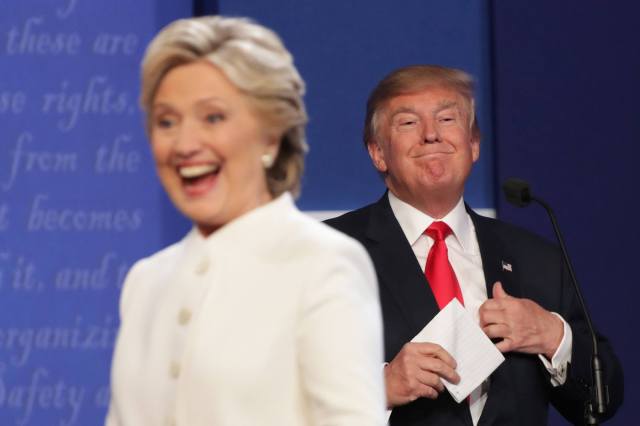Credit: Chip Somodevilla / Getty

Political Realignment Week continues with a suggestion from the USA.
The Democratic and Republican parties have long dominated politics in America, controlling Congress and the Presidency for over 150 years. And yet, over 40% of Americans do not consider themselves to be Democrats or Republicans, and over 60% of Americans say the country needs a new, major third party. I would like to propose, therefore: the National Party.
It would sit between the present Democratic and Republican parties on many issues. On economics, it would share the Republican emphasis on the importance of the private sector, while recognising that the state does have a crucial role to play in ensuring all citizens have a genuine opportunity to live decent, dignified lives of their own choosing.
On social issues, it would protect the rights of the unborn, women, and gays and lesbians equally. On cultural issues, it would emphasise shared American values such as freedom, natural rights, and the rule of law, while dispensing with identity politics from the Left (such as those based on gender and race) and the Right (such as those based on religious belief or ethnic heritage).
On foreign policy, it would seek to redefine America’s global role so that it empowers its allies to solve local problems on their own while maintaining America’s ability to defend its direct interests anywhere, any time.
National would not be a party of the mushy middle. Centre parties often have a difficult time finding an identity because they define themselves by what they are not rather than by what they are. This is mainly why a party combining Blairites, Cameroons, and the Liberal Democrats has not yet arisen in Britain: “Not Corbyn and not May” is not a party. National would instead robustly defining by its positive values.
The first and most important value by which it would define itself is human dignity. The Declaration of Independence, America’s founding document, affirms the “self-evident” truth “that all men are created equal”. Most people recognise that this is itself both true and false: people clearly differ widely in their talents, drive, and beliefs.
But there remains nonetheless something that all people share – dignity. We are all capable of loving ourselves and others; we are all capable of acting justly; we are all capable of deriving worth and producing value from our actions. Abraham Lincoln, America’s 16thand greatest President, defined this equality simply: “As I would not be a slave, so I would not be a master”. National would adopt this as its core principle.
This principle would allow National to address America’s core challenge: how do you reunite a badly divided nation. Our political parties are unable to compromise because they are increasingly in the grips of ideological extremes who see their opposites as tyrannical and unAmerican. The extremes define the party, since their candidates can win primaries, in which ideologically driven voters tend to hold sway.
A majority of voters may not want either candidate, as was the case in the 2016 presidential election, but our bipartisan system forces them to choose. This is the root cause behind the growing dissatisfaction with American politics and the shrinking share of Americans who identify with one of the two major parties.
National would speak to these people with its simple message. It could show how Christians and gays, workers and bosses, black and white, could all get along. It could show how active discrimination against a minority deprives those people of the human dignity we all share, and how replacing one discriminatory regime with another simply enslaves a new set of people.
National could show how a global economy that treats its citizens as mere units of production effectively reduces them to slaves and the owners of capital as masters. It could show how a foreign policy that treats all other nations as incapable of handling their affairs without American direction treats those nations as slaves, stoking resentment and encouraging infantilism in equal measures, and risks making the American empire a much harsher regime.
My new party could come into being in one of two ways. It could be an expanded and redefined Republican Party, bringing into that party’s embrace the disaffected moderates who currently find both parties offputting. That is how the original Republican Party came into being, building on the old Whig Party to add former Democrats and new immigrant voters who rejected the Democratic Party’s increasing defense of Southern slaveowners.
Or it could be an American version of French President Emmanuel Macron’s Republique en Marche, which is a union of centre-left, centre-right, and centrist voters. Each approach would have its distinctive character, the latter likely being less friendly to traditional religious values than the former, but each would derive strength by being for something, rather than by being an expression of what it is against.
Forming National will not be easy. Old habits die hard, and it remains to be seen whether popular dissatisfaction with both party extremes is strong enough to impel political entrepreneurs to take the risk of creating this new party.
Nor is it obvious that those who might want to do so, such as Ohio Governor John Kasich, possess the breadth of vision to present a positive alternative to the status quo, rather than run as the “not progressive, not conservative” mushy middle.
But America badly needs a party like National, one that cares about all members of our great nation and does not simply advance the interests of a tiny few. Thus, fondly do I hope – fervently do I pray– that National is created soon so that it might “bind up the nation’s wounds” and restore the lustre to the American dream.










Join the discussion
Join like minded readers that support our journalism by becoming a paid subscriber
To join the discussion in the comments, become a paid subscriber.
Join like minded readers that support our journalism, read unlimited articles and enjoy other subscriber-only benefits.
Subscribe